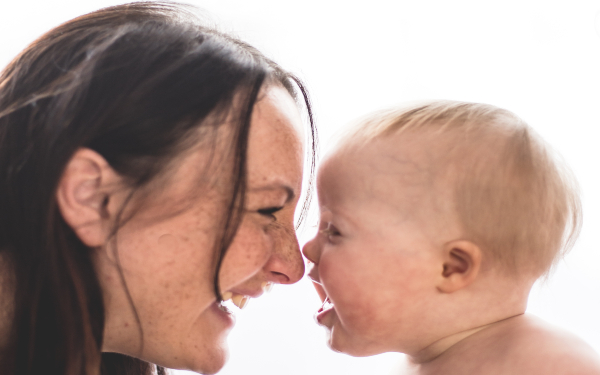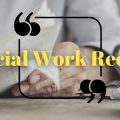
By Alice Osborne (this article was written for World Down Syndrome Day – 21 March)
In 2017, we welcomed our second child, Ted, into the world. Ted was diagnosed postnatally with Down syndrome when he was three weeks old. His Down syndrome hadn’t been identified when he was first born, which is unusual. I can wholeheartedly say that becoming Ted’s mum changed not only my life and my views, but also my practice as a social worker with seven years’ post-qualifying experience of working in learning disability services.
After Ted was diagnosed, we were given an insert for his ‘red book’. It detailed health conditions, the ‘medical surveillance’ recommendations and a delayed milestone list. The same baby went into that appointment with his parents as came out of the appointment, but after the appointment he was labelled, he had been ‘disabled’ because of that extra chromosome that they had identified. However, he was still the same baby, and was the same bundle of potential as any other baby.
We knew we needed support, not from the litany of health professionals, but from others who had walked this path before us. I needed to find a peer, someone who understood and who could help us understand more. We found Portsmouth Down Syndrome Association. From the moment we made contact they were there, supporting us, reassuring us and offering advice, and welcoming us to social events so we could meet other families, and make friends and vital connections.
‘How would we manage?’
I struggled to see ‘my baby’, instead spending time picturing Ted as an adult. How would he find his way? How would we manage? Why were we the ones in need of services? What would this mean to us? Would he be subject to some of the safeguarding atrocities that I had investigated? How could I keep him safe for his whole life?
It felt like an alarm going off in my head, shouting ‘Down syndrome’ every time I looked at my new-born baby and saw his beautiful blue almond eyes and sparkling brush field spots and felt his soft body relax into mine. Within a few weeks, as Ted perfected his charm and smiles, I relaxed and saw him as Ted, our beautiful baby boy, who just needed love and milk, the same as any and every baby. Those feelings hadn’t fully ‘gone away’, but we had got to know him, and to love him for everything that he is.
Maternity leave was different this time though. Gone were the closeness of friendships with other mums and bonding over lack of sleep. Instead, we entered a daunting professional new world of multiple health appointments, from cardiologists to sleep clinics, to paediatricians, and being frequent flyers within the GP practice during winter season. For someone who thought I knew a lot about Down syndrome and learning disabilities from my career – gosh I was naïve!
‘Having my son made me a better social worker’
I learnt so much from our beautiful little tour guide, Ted. I read, I researched, I learnt. I realised there was much that I should have known, much more that would have guided my practice and made me a better social worker. I learnt about sleep apnoea, and I realised that one of the middle-aged gentlemen I had been working with, who had been waking frequently, should have been referred to have his oxygen checked overnight. His frequent waking at night might not have been a ‘behaviour’, but a medical need should have been identified.
As Ted grew and approached his 1st birthday, I prepared to go back to work. I knew that I needed to share what Ted had taught me. So, I planned a ‘peer supervision’ session, sharing with my team my experiences and the support and health needs that I should have known about before.
My role with Portsmouth DSA changed too. Ted started to access their educational development groups, and I learnt much more about the learning profiles associated with Down syndrome and how to support Ted, provide information on his strengths and support his development. I wanted to repay the support we received and started to volunteer with Portsmouth DSA. Portsmouth DSA launched a new parent pack in our local hospital, and I was asked to provide talks about our experiences to neonatal intensive care unit teams, midwives and doctors.
The role expanded and, a year later, I was invited to become the primary and early year team manager and provide training to health and social care professionals about all aspects of Down syndrome, representing Portsmouth DSA. I now regularly train students and practitioners froma wide variety of disciplines. I volunteer for Portsmouth DSA’s new parent support service and have the privilege and honour to be one of the first contacts that a family will have after they too get a diagnosis of Down syndrome for their child. It sounds obvious but becoming Ted’s mother made this personal; it’s a passion and much more than my profession.
Language matters
One aspect that matters, not just to me, but to the families that I talk with, is language. What we say as professionals matters! We all know this, but the impact that words can have on a family, even 15 years later, when we or a colleague didn’t get it right, is the bit we don’t see as practitioners. It hurts and it’s important. You wouldn’t call me Asthma Alice, so why would you refer to a person with Down syndrome as a Down syndrome person? At Portsmouth DSA we advocate for person-first language. Our young people are people who happen to have Down syndrome; we need to see the person before the condition and use language which reflects that.
Our children are often very good visual learners and, with the right support and intervention, can be good readers and manage well in mainstream school, achieving qualifications and readiness for adulthood. With high expectations at home and at school, children and adults with Down syndrome can have good daily living skills. Ability doesn’t equal worth, however, and some children and adults will have more complex needs. But just like everyone else, every person with Down syndrome needs to be seen and treated as an individual.
My suggestions for supporting a child, young person or adult about Down syndrome, is to access training, such as provided by Portsmouth DSA, find out more about your local support groups, and ask families, ‘how can I help?’. Make sure you are focusing on what matters to them. Remember the health needs that can be more prevalent for people with Down syndrome, learn more about how they can affect an adult and think about them when you meet with a family and make your assessments. Sometimes our children have complex health needs with many different professionals involved, so read up before you visit, learn about Down syndrome and consider what you can do to make a difference.
Remember that when you are working with a child or adult with Down syndrome, it will be for a snapshot of their lifetime. That person exists within a family and a community, and we need to support and skill up that individual and their family and community. We aren’t the experts – they are. It is our role to ensure that services are there to enable actual aspirations, paid employment, housing and real opportunities for people with Down syndrome. When people with Down syndrome are given the right support and opportunities to be fully included in society, the whole community benefits.




 Bournemouth, Christchurch and Poole
Bournemouth, Christchurch and Poole  Hampshire County Council
Hampshire County Council  Lincolnshire County Council
Lincolnshire County Council  Norfolk County Council
Norfolk County Council  Northamptonshire Children’s Trust
Northamptonshire Children’s Trust  South Gloucestershire Council
South Gloucestershire Council  Wiltshire Council
Wiltshire Council  Wokingham Borough Council
Wokingham Borough Council  Children and young people with SEND are ‘valued and prioritised’ in Wiltshire, find inspectors
Children and young people with SEND are ‘valued and prioritised’ in Wiltshire, find inspectors  How specialist refugee teams benefit young people and social workers
How specialist refugee teams benefit young people and social workers  Podcast: returning to social work after becoming a first-time parent
Podcast: returning to social work after becoming a first-time parent  Podcast: would you work for an inadequate-rated service?
Podcast: would you work for an inadequate-rated service?  Family help: one local authority’s experience of the model
Family help: one local authority’s experience of the model  Workforce Insights – showcasing a selection of the sector’s top recruiters
Workforce Insights – showcasing a selection of the sector’s top recruiters 

 Facebook
Facebook X
X LinkedIn
LinkedIn Instagram
Instagram
What an extremely helpful article to read. Thank you so much.
What an amazing story! As someone with a 5yo who happens to have DS, so much of this chimed. Thank you for sharing.
I really admire your commitment to your son and how you’ve used your personal experience to inform your practice.
I am also in a similar situation as I have a daughter living with DS, equally I am also an adult social worker but haven’t been in practice for a number of years, hoping to return soon.
Thanks for sharing your story
My daughter is now 37. She has 7 passes at GCSE including a C, D and 2 Es.
She has trained professionals and groups all over the UK – until I became too old and decrepit to keep up with her.
Officially we are still training med students but not since covid started.
Her favourite bit of her speech – she grins at them and says *I like this bit*
Alors maintenent un petit peu en Francais. Bonjour comment ca va. Je suis tres heureuse d’etre ici aujourdhi. **then where she lives***
d’accord maintenent en Anglais.
After asking who understood etc – she launches into her main purpose — COMMUNICATION.
Tells them communication is the key to a life you choose yourself – and a whole lot more.
I had to make it up as I went along but having seen how people with diverse learning disabilities were treated when I volunteered at a *subnormality hospital 50 years ago now – my daughter was not going to end up in that kind of place.
I love your conclusion. And yes, language matters and values are held to a high standard in our team. This is part of our team culture.
Well written. Very touching and fruitful for the community.